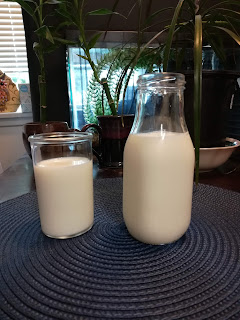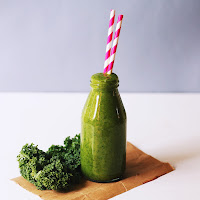 |
| Image via Pixabay |
In less than 24 hours, everything was moved out of my old apartment and into the new. The move was exhausting, and we didn't get much sleep, but it was done.
In fact, I was proud of myself this time. You see, I managed to get every box labeled by room, even though I wasn't the only one packing. It was the move to end all moves. Fast. Organized. Perfect.
But then I opened that box.
When I lifted the box labeled "KITCHEN: glasses and bowls", I heard an ominous
Clink
Clink
Clunk
and I knew I was in trouble. I opened a box and lifted a towel to find glass fragments twinkling up at me. Half of my drinking glasses were broken.
Well, so much for a perfect move!
At the time, I was having some money issues, so buying a brand new set of drinking glasses wasn't an option.
I stared at the bottle of coffee on the counter.
You know the type of bottle I'm talking about: the prepackaged, pre-mixed coffee sold by companies like Starbucks. This particular brand had an easy to remove label. That wasn't the only part of it that made me smile, however. I also realized that it held the same amount of liquid as my broken glasses were created to hold.
I loved this cold coffee, which meant that I occasionally bought it for myself as a special treat. Now, though, it was useful as well.
I collected all the glass coffee bottles I bought, removed their labels, and washed them. Within a few months, I had a full set of drinking glasses, again. I continued, saving other glass containers that held food or drink products. Finally, I was able to store most of my leftovers in glass, rather than plastic.
 |
| Rice seasoning container on left, coffee on right |
Plastic is made using petrochemicals, and has a very high chance of releasing toxins into your body if it becomes unstable through overuse or overheating. Glass, though, remains safe and non-toxic. That's not all, however.
Choosing to re-use your glass containers is both eco-friendly and frugal.
Take my forced re-usage as an example.
Glass containers can be re-used and repurposed in multiple ways.
You see the photo of my new drinking glasses above. However, I also have a half-gallon milk jug that I use for iced tea, a salsa bottle that holds half & half, a chili oil jar containing pens and pencils, and so much more.
If you imagine a new purpose for your glass, you can bring that vision to life.
It's not only cheap, but saves money, as well.
Think about it. Yes, you do have to buy the container, but you're not going out to buy some glass. You're buying pizza sauce, or salsa, or something else. It just happens to have a glass container. This means that many of your home purchases are non-existent.
Food grade glass is stronger than you think.
That's probably the one thing I constantly hear about from people.
"It's so strong!" "This is stronger than my glasses at home!"
These containers withstand constant movement. They are stocked and re-stocked, customers pick them up, put them down, pick them up again, and drop them into their carts. They take a serious beating.
 |
| Photo by Alisha Mishra via Pexels |
It's guilt free.
You're not contributing to the plastic islands floating around our ocean. If your glass container breaks, you can throw it out without fear of putting toxins into our environment.
Not only that, but if you simply get tired of it and dump it into your recycling bin, there's no guilt. Not only are you recycling it, you've also re-used and repurposed an item. Talk about eco-friendly!
You have a great conversation starter.
Whenever someone comes to my home for the first time, they'll hold up the glass bottle of water that I hand to them, and examine it with curiosity. They always want to know more about it, and many start re-using their own glass containers. Some talk about ways that they or a family member have repurposed glass in the past.
With so many ways to both save money and be eco-friendly simply by choosing not to throw out a few used food containers, everybody should want to. In what ways have you repurposed glass containers?



No comments:
Post a Comment